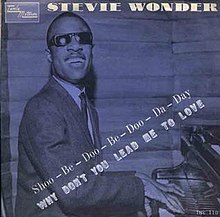
Stevland Hardaway Morris, known professionally as Stevie Wonder, is an American singer, songwriter, musician and record producer. Wonder is credited as a pioneer and influence by musicians across a range of genres that includes rhythm and blues, pop, soul, gospel, funk, and jazz. A virtual one-man band, his use of synthesizers and other electronic musical instruments during the 1970s reshaped the conventions of R&B. He also helped drive the genre into the album era, crafting his LPs as cohesive, consistent socially conscious statements with complex compositions.
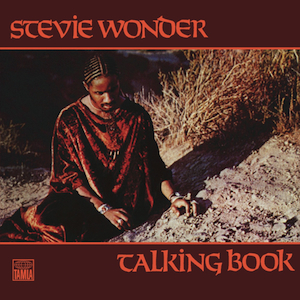
Talking Book is the fifteenth studio album by American singer, songwriter and musician Stevie Wonder, released on October 28, 1972, on the Tamla label for Motown Records. This album and Music of My Mind are widely noted as being the signal recordings of Wonder's "classic period". The sound of the album is sharply defined by Wonder's keyboard work, especially with synthesizers. His use of the Hohner clavinet model C on "Superstition" is widely regarded as one of the definitive tracks featuring the instrument.

"Superstition" is a song by American singer-songwriter Stevie Wonder. It was released on October 24, 1972, as the lead single from his fifteenth studio album, Talking Book (1972), by Tamla. The lyrics describe popular superstitions and their negative effects.
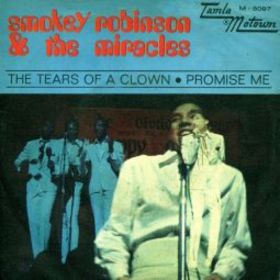
"The Tears of a Clown" is a song written by Hank Cosby, Smokey Robinson, and Stevie Wonder and originally recorded by Smokey Robinson & the Miracles for the Tamla Records label subsidiary of Motown, first appearing on the 1967 album Make It Happen. It was re-released in the United Kingdom as a single in July 1970, and it became a #1 hit on the UK Singles Chart for the week ending 12 September 1970. Subsequently, Motown released "The Tears of a Clown" as a single in the United States as well, where it quickly became a #1 hit on both the Billboard Hot 100 and R&B Singles charts.

"Uptight " is a 1965 hit single recorded by American singer-songwriter Stevie Wonder for the Tamla (Motown) label. One of his most popular early singles, "Uptight " was the first hit single Wonder co-wrote.
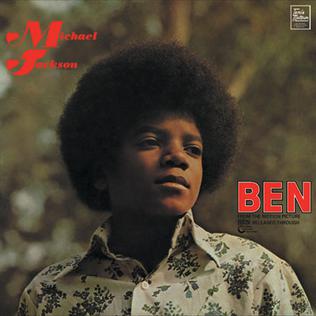
Ben is the second studio album by American singer Michael Jackson, released by Motown Records on August 4, 1972, while Jackson was still a member of The Jackson 5. The album received mixed reviews from contemporary music critics. Ben was more successful on the music charts than Jackson's previous studio album, having charted within the top 10 on the Billboard 200. Internationally, the album was less successful, peaking at number 12 in Canada, while charting within the top 200 positions in Australia and France.

Music & Me is the third studio album by American singer Michael Jackson, released on April 15, 1973 on the Motown label. The album was reissued in 2009 as part of the three-disc compilation Hello World: The Motown Solo Collection.

"I Was Made to Love Her" is a soul music song recorded by American musician Stevie Wonder for Motown's Tamla label in 1967. The song was written by Wonder, his mother Lula Mae Hardaway, Sylvia Moy, and producer Henry Cosby and included on Wonder's 1967 album I Was Made to Love Her.
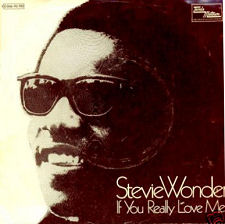
"If You Really Love Me" is a song written by Stevie Wonder and Syreeta Wright. Wonder recorded the song and released his version as a single from his 1971 album Where I'm Coming From. The single peaked in the top 10 of the Billboard Hot 100, Billboard′s R&B chart, and Billboard′s Easy Listening chart.

"For Once in My Life" is a song written by Ron Miller and Orlando Murden for Motown Records' Stein & Van Stock publishing company, and first recorded in 1965.
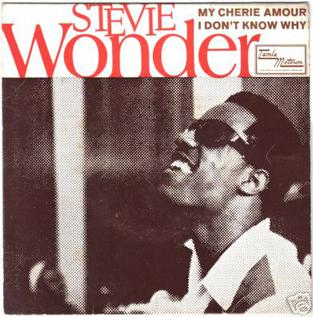
"My Cherie Amour" is a 1969 song by Motown singer-songwriter Stevie Wonder. The song reached number 4 on the Billboard pop chart in August to be Wonder's third Top Ten hit. The song was co-written by Wonder, Sylvia Moy, and Henry Cosby; Cosby also served as producer of the song. At the end of 1969, the song was ranked number 32 for the year.

"You Haven't Done Nothin" is a 1974 funk single by Stevie Wonder, taken from his album Fulfillingness' First Finale and featuring background vocals by The Jackson 5. The politically aware song became Wonder's fourth Number 1 pop hit and his tenth Number 1 soul hit. It also reached Number 1 in Canada. In the UK the single spent five weeks on the chart, peaking at Number 30.
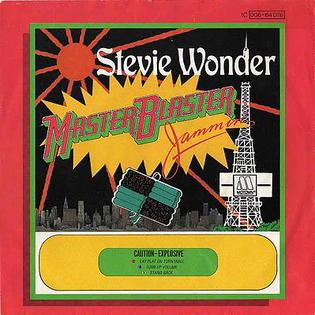
"Master Blaster (Jammin')" is a 1980 single by American singer-songwriter Stevie Wonder from his 1980 album Hotter than July. It was the lead single from the album.

For Once in My Life is the ninth studio album by American singer-songwriter Stevie Wonder on Motown Records, released in November 1968. Then eighteen years old, Wonder had established himself as one of Motown's consistent hit-makers. This album continued Wonder's growth as a vocalist and songwriter, and is the first album where he shares credit as producer. It featured four songs that hit the Hot 100 charts: "For Once in My Life" (#2), "Shoo-Be-Doo-Be-Doo-Da-Day" (#9) and the modest hits "I Don't Know Why" (#39) and "You Met Your Match" (#35). It also marked the debut of the Hohner Clavinet on a Stevie Wonder album, which would become a mainstay on albums to come.

Stevie Wonder Live is a 1970 live album by American musician Stevie Wonder on the Tamla (Motown) label. The second live collection by the singer-songwriter, it was released during the crossroads of Wonder's career as he was preparing to negotiate a new contract with Motown that gave him artistic control over his work.
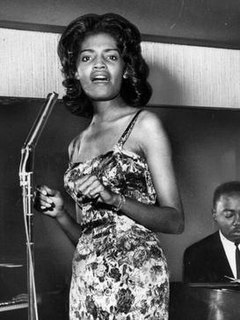
Sylvia Rose Moy was an American songwriter and record producer, formerly associated with the Motown Records group. The first woman at the Detroit-based music label to write and produce for Motown acts, she is probably best known for her songs written with and for Stevie Wonder.

"I Don't Know Why" is a song by American singer-songwriter Stevie Wonder, from the 1968 album For Once in My Life. It was released as a single on January 28, 1969, with "My Cherie Amour" on the B-side. A few months later, the single was re-issued with sides reversed because of the growing popularity of "My Cherie Amour", which became a Top Ten hit.

"I Ain't Gonna Stand for It" is the second single from Stevie Wonder's 1980 album, Hotter Than July. It reached number four on the Billboard R&B singles chart and number 11 on the Hot 100. It also hit number 10 on the UK Singles Chart. The song is famous for Wonder's imitation of a seasoned country-and-western crooner and his inspiring drumming. Charlie and Ronnie Wilson of The Gap Band provide backing vocals on the song. It was covered by Eric Clapton in 2001.

"Never Had a Dream Come True" is a song written by Stevie Wonder and Motown staff songwriters Henry Cosby and Sylvia Moy and released as a single on the Tamla subsidiary by Wonder in February 1970. Featured on his twelfth studio release, Signed, Sealed & Delivered as the lead single, the song was a modest hit in the US upon its release, debuting at number sixty-seven on the Billboard Hot 100 during the week of February 7, 1970, and number-eleven on the R&B chart. The song received a boost in the UK, where it eventually broke into the top ten and peaked at number-six.
"You Met Your Match" is a song written by Stevie Wonder, Lula Mae Hardaway, and Don Hunter that was released by Wonder on his 1968 album For Once in My Life. It was also released as a single and reached No. 35 on the Billboard Hot 100 and No. 2 on the Billboard R&B chart.
